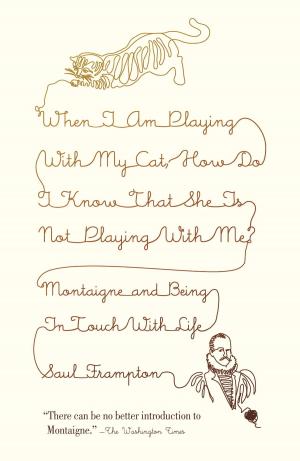| Author: | Nancy Schoenberger | ISBN: | 9780307822352 |
| Publisher: | Knopf Doubleday Publishing Group | Publication: | July 18, 2012 |
| Imprint: | Nan A. Talese | Language: | English |
| Author: | Nancy Schoenberger |
| ISBN: | 9780307822352 |
| Publisher: | Knopf Doubleday Publishing Group |
| Publication: | July 18, 2012 |
| Imprint: | Nan A. Talese |
| Language: | English |
Caroline Blackwood was born into the Guinness family in 1931, the daughter of the Fourth Marquess and Marchioness of Dufferin and Ava. Brought up on the ancestral estate in Northern Ireland, Blackwood moved easily among the Anglo-Irish aristocracy, the Soho bohemians of postwar England, and the liberal intelligentsia of 1960s New York. She was on intimate terms with some of the most celebrated artists and writers of her time. An unpredictable beauty known for her wit and her courage, she has been called a muse to genius. But her marriages to three brilliant men: the painter Lucian Freud, the composer Israel Citkowitz,
and the poet Robert Lowell were as troubled as they were inspiring.
During her marriage to Lucian Freud, Caroline became part of an artistic and literary group that included Francis Bacon and Cyril Connolly who was infatuated with her but eventually Freud's gambling caused irrevocable problems between them. Caroline was also in the grips of her own unfolding tragedy: a fatal attraction to alcohol that would plague the rest of her life.
Upon the breakup of her first marriage, she moved to America , where she met her second and third husbands. Once regarded as the obvious successor to Aaron Copland, Israel Citkowitz had stopped composing long before he met Caroline. While he and Caroline had three children together, it was her subsequent seven year marriage to Robert Lowell that she considered her "main marriage." Her life with Lowell was probably the most difficult time of her life as she dealt with his increasingly frequent and worsening attacks of mania. And to Lowell she was not only an inspiration but_as he described in his Pulitzer-prize- winning book of verse The Dolphin, she was also "a mermaid who dines upon the bones of her winded lovers." In 1977, Robert Lowell fled London to return to his former wife Elizabeth Hardwick. He died from a heart attack in the backseat of a taxi, clutching Girl in Bed, Lucian Freud's haunting portrait of Caroline.
Blackwood was an artist in her own right. Her literary talents were dark and satiric; her ten books of fiction and nonfiction betrayed an extraordinary eye for human physiognomy, attire, and behavior. Arguably her best book, Great Granny Webster described the comic terrors of her upbringing in Northern Ireland, and was shortlisted for the Booker Prize. She herself died of cancer on Valentine's Day 1996, at the age of sixty-four.
Dangerous Muse is the first biography of Lady Caroline Blackwood. Drawing upon numerous interviews and unpublished letters from Blackwood's mother, Maureen Dufferin, and friends and family, including Andrew Harvey, Jonathan Raban, John Richardson, and Caroline's sister Perdita Blackwood, Nancy Schoenberger eloquently captures one of the most original and provocative figures in contemporary letters of the twentieth century.
Caroline Blackwood was born into the Guinness family in 1931, the daughter of the Fourth Marquess and Marchioness of Dufferin and Ava. Brought up on the ancestral estate in Northern Ireland, Blackwood moved easily among the Anglo-Irish aristocracy, the Soho bohemians of postwar England, and the liberal intelligentsia of 1960s New York. She was on intimate terms with some of the most celebrated artists and writers of her time. An unpredictable beauty known for her wit and her courage, she has been called a muse to genius. But her marriages to three brilliant men: the painter Lucian Freud, the composer Israel Citkowitz,
and the poet Robert Lowell were as troubled as they were inspiring.
During her marriage to Lucian Freud, Caroline became part of an artistic and literary group that included Francis Bacon and Cyril Connolly who was infatuated with her but eventually Freud's gambling caused irrevocable problems between them. Caroline was also in the grips of her own unfolding tragedy: a fatal attraction to alcohol that would plague the rest of her life.
Upon the breakup of her first marriage, she moved to America , where she met her second and third husbands. Once regarded as the obvious successor to Aaron Copland, Israel Citkowitz had stopped composing long before he met Caroline. While he and Caroline had three children together, it was her subsequent seven year marriage to Robert Lowell that she considered her "main marriage." Her life with Lowell was probably the most difficult time of her life as she dealt with his increasingly frequent and worsening attacks of mania. And to Lowell she was not only an inspiration but_as he described in his Pulitzer-prize- winning book of verse The Dolphin, she was also "a mermaid who dines upon the bones of her winded lovers." In 1977, Robert Lowell fled London to return to his former wife Elizabeth Hardwick. He died from a heart attack in the backseat of a taxi, clutching Girl in Bed, Lucian Freud's haunting portrait of Caroline.
Blackwood was an artist in her own right. Her literary talents were dark and satiric; her ten books of fiction and nonfiction betrayed an extraordinary eye for human physiognomy, attire, and behavior. Arguably her best book, Great Granny Webster described the comic terrors of her upbringing in Northern Ireland, and was shortlisted for the Booker Prize. She herself died of cancer on Valentine's Day 1996, at the age of sixty-four.
Dangerous Muse is the first biography of Lady Caroline Blackwood. Drawing upon numerous interviews and unpublished letters from Blackwood's mother, Maureen Dufferin, and friends and family, including Andrew Harvey, Jonathan Raban, John Richardson, and Caroline's sister Perdita Blackwood, Nancy Schoenberger eloquently captures one of the most original and provocative figures in contemporary letters of the twentieth century.















